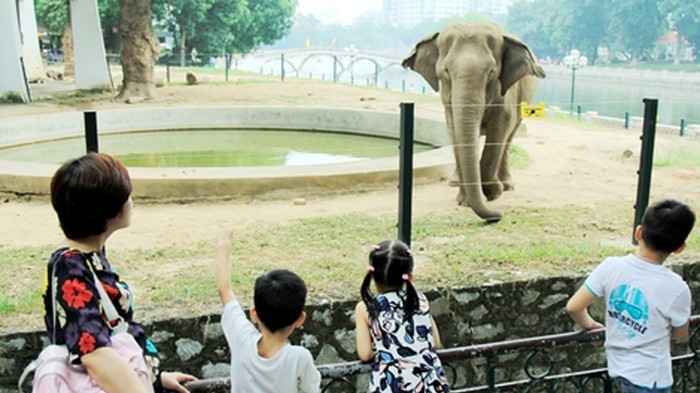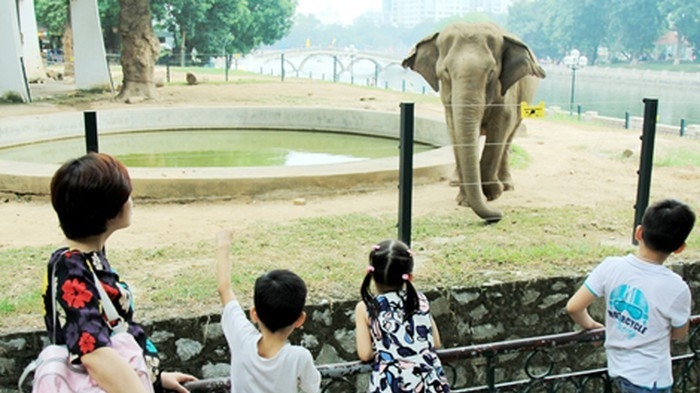
Hanoi Zoo, in Ba Dinh district, Hanoi, was recognised as a tourist site according to a recent decision approved by the Hanoi city People’s Committee.

Children watching an elephant at the zoo
The decision also announced that Hanoi Zoo Co. Ltd has
responsibilities to manage and develop the site in accordance with the Law on
Tourism and related legal documents.
Established in 1976, Hanoi Zoo, also
known as Thu Le Park, covers around 29 hectares in Ngoc Khanh ward.
It is home to 600 individuals of over
100 species including amphibians, saltwater fishes, mammals, and birds. More
than 40 species among them are endemic species which are listed in the
Vietnam’s Red Book, such as the Asian golden cat, Indochinese tiger, leopard,
and Vietnamese fireback.
Hanoi Zoo joined the South East Asian
Zoos Association in 1993 and has expanded its cooperation with many zoos and
other wildlife conservation organisations around the world.
It
opens for the public from 8:00 to 18:00 every day, with an entrance fee of
VND10,000 for adults and VND5,000 for children.
Source: NDO
A diverse chain of eco-tourism and resort destinations concentrated in Hoa Binh city and the districts of Tan Lac, Da Bac, and Luong Son… Along with the launch of several key high-quality resort tourism projects, these developments have reshaped the landscape and enhanced the appeal of Hoa Binh as a travel destination.
Boasting diverse terrain, a mild climate, and rich natural resources, Cao Phong district is increasingly asserting its place on Vietnam’s tourism map, attracting both domestic and foreign visitors. The district is renowned for its stunning landscapes, majestic mountains, a crystal-clear hydropower lake, and the unique cultural identity of local ethnic groups.
With its pristine landscapes, unique cultural heritage of Muong ethnic minority, and an expanding range of visitor experiences, Tan Lac district of Hoa Binh has fast become a captivating destination for both domestic and international tourists.
Until now, Sung village in Cao Son commune, Da Bac district remains the only Dao ethnic community in Hoa Binh province to develop a community-based tourism model. Beyond its untouched natural landscapes, cultural identity serves as the cornerstone attraction for visitors.
Alongside the diverse cultural identities of the Kinh, Muong, Tay, Thai, Dao, and Mong ethnic people, Hoa Binh province is also renowned as the "capital" of the northwestern Vietnamese cuisine, offering unique and distinctive dishes. At festivals, during Lunar New Year (Tet), or on significant family or community occasions, special dishes are prepared, leaving a lasting impression on visitors.
A Phong Linh (Yellow Tabebuia) flower garden in Thang village, Thach Yen commune, Cao Phong district is currently in full bloom, drawing a large number of visitors.



